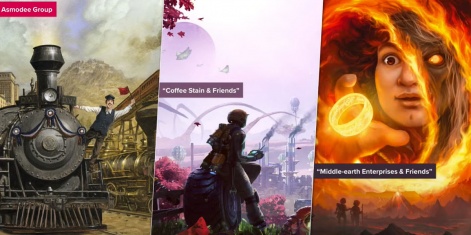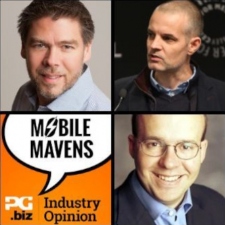Additional reporting by Paige Cook.
Earlier this week Embracer Group unveiled plans to break up the firm into three separate publicly listed companies.
Each entity will have its own focus and goals. Asmodee Group will cover the publishing and distribution of tabletop games. Middle-Earth Enterprises & Friends will operate as a triple-A developer, keeping ownership of giant IPs such as Tomb Raider and The Lord of the Rings. Finally, Coffee Stain & Friends will focus on indies and free-to-play titles across various platforms.
The news follows years of Embracer Group’s aggressive M&A strategy and a company restructuring last year, sparked after losing out on a $2 billion investment. To clear $1.5 billion in debts, the company has sold off studios and laid off thousands of employees.
To help make sense of the plans, we reached out to a few leading industry analysts for their perspective on how Embracer got here and what the road ahead looks like.

A specialist games industry consultant with over 17 years’ experience including 8 years as a financial analyst assessing games companies and the global games market. This has provided extensive and unique insight into the business of games development, publishing, distribution and monetisation for all types of games on console and handheld, mobile and MMOG, social network and all types of online gaming.
Embracer Group’s rapid dissolution into so many constituent parts over the last year or so is both entirely predictable and also the only sensible way of solving the problems created by such haphazard and unrestrained expansion-via-acquisition over the previous four to five years.
It’s certainly good news for the companies involved, as the alternative of staying part of such a large, unwieldy group was clearly unsustainable.
Embracer Group appears not to have learned from these and so many other industry lessons.Nick Gibson
Games industry history has taught us that integrating a single studio acquisition into a new parent company can be hard enough. Doing this a dozen or more times each year is simply asking for trouble.
Adding studios and IP is not an infinitely scalable strategy – it quickly becomes self-defeating with audience overlap, company resource cannibalisation and unwanted compromises across the board to make everything fit and keep everyone happy.
Ubisoft went through a major strategic rethink early in its existence, deciding that “less is more”, i.e. having 100+ SKUs released in a given year was not scalable or viable in the long-term.
It pivoted to focusing on a far smaller number of bigger, higher-quality releases that it aimed to turn into franchises by doing so. It could easily have fallen by the wayside, as others with the former strategy did (Infogrames, Titus, etc.), but its new strategy turned out to work pretty well.
Embracer Group appears not to have learned from these and so many other industry lessons.

Academic and entrepreneur with expertise in video games.
Embracer’s three-way split is the financially mature thing to do. In case you missed it, last year, I predicted Embracer's inevitable decline.
Clearly, the Swedish gaming conglomerate was struggling in its form as a federation of different projects and properties. This means that every studio must help pay the debt the mothership has accumulated by making many acquisitions. That’s unsustainable. It’s a distraction from the creative process and destroys capital assets like talent and goodwill.
The three parts will be worth more than a single Embracer. It had previously acquired Asmodee for $3 billion, and the tabletop and board game category has continued to perform well. By divesting the different components into publicly traded companies, it will free high-performing divisions from carrying the debt Embracer accrued during the boom of 2020.
It also makes the new Middle-Earth Enterprises & Friends division a ripe acquisition target.Joost van Dreunen
It also makes the new Middle-Earth Enterprises & Friends division a ripe acquisition target, given the strength of its IP portfolio.
Embracer has been trying to sell off several of its divisions for the past 18 months, but outside of a few sales, like the $460 million sale of Gearbox to Take-Two Interactive, it was unable to find any buyers. Following a disappointing yard sale, it is now splitting the company to alleviate the debt load and restructure its financing.
The recent sale of Gearbox was a steal for Take-Two. Embracer’s need for cash forced it to sell assets at much lower valuations. It originally put together a deal package totalling $1.3 billion for Gearbox.
In the run-up to the sale, Embracer apparently also already performed the bloodletting, laying off a third of Gearbox's studio in the Netherlands, for instance. Take-Two saw a good deal and moved on it.
Maybe we can get back to making games again.
The troubles with Embracer are dragging down people's perceptions. Quite rightly, because a company's valuation is a combination of how much money it is making multiplied by the risk that things might go wrong. I'm simplifying massively, but that's the premise. And if you look at Embracer, the risk that things might go wrong is really high right now. So, things like Asmodee are probably undervalued.
I could imagine investors saying, 'I don't want to touch Embracer with a barge pole right now, it's too risky'. But Asmodee looks like a well-managed, operating business. It makes sense.
I’m mentioning Asmodee because I'm quite nervous about the others. If I look at Coffee Stain & Friends, it seems quite a lot like the UK publicly listed companies, like Devolver, Team17, TinyBuild, and even Frontier.
They all have had well-publicised difficulties with being mid-sized companies in a tricky market. That's what Coffee Stain looks like. Great IPs, but it's just an awkward size. If it manages to get several hits, it does amazingly well, but if it has a quiet year, investors go off it, and we've seen that. So that's a challenge.

I'm also nervous about the Middle-Earth one because it looks quite a lot like remaking Eidos, which didn't work because it wasn't big enough.
You've got Crystal Dynamics, bits of Eidos Montreal, and Middle Earth rights and licences. It's sort of like splitting up into three is almost not quite enough.
You put together a double-A, triple-I, indie studio with a mobile, free-to-play, casual space studio; those are two quite different businesses with very different capital requirements and management challenges. And you put together an IP-only licence business with a triple-A studio trying to make games that cost tens or hundreds of millions of dollars into a crowded market.
I'm hoping that they will set out a clear strategy to reduce the volatility of the earnings over time.Nicholas Lovell
If you have to combine them into only three, they are the logical combination. But if you started with Coffee Stain & Friends without the mobile F2P, would you buy an F2P Sudoku business to bolt onto it? I'm not sure you would. And if you had the Middle-Earth IP rights, would you buy the Tomb Raider developer? Again, I'm not sure you would.
I'm only looking at this at a high level. I could see a way for success for all three businesses. To be clear, I don't want to seem relentlessly negative. Asmodee will easily be a success. I think Coffee Stain will have the same ups and downs as Devolver since its IPO.
As for the Middle-Earth & Friends business, some of the people running it are people who have hopefully learnt from the challenges of Eidos and maybe will be more successful. But if what they are doing is making really expensive one-off bets in the hope it works, that's not a terribly great public company strategy. You need more predictability.
So, I'm hoping that they will set out a clear strategy to reduce the volatility of the earnings over time.





















